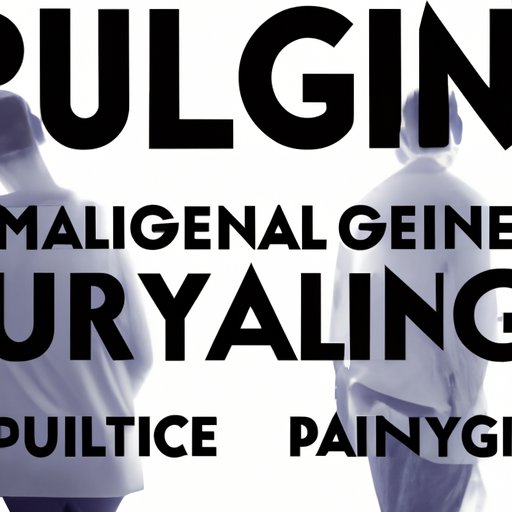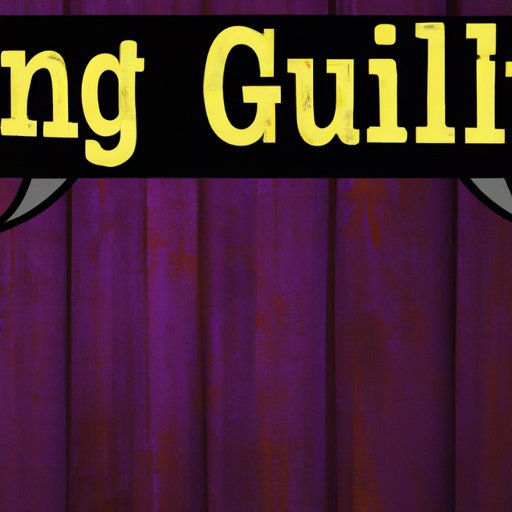Introduction: What Is Guilt Tripping?
Guilt tripping is an emotionally manipulative tactic used to try to control someone’s behavior or elicit a certain response from them. It involves making a person feel guilty for their actions or for something they have not done in order to manipulate them into doing what you want. Guilt tripping can be subtle or overt, but it always has a negative impact on the person being manipulated.
The term “guilt tripping” was first used in the 1960s and is still widely used today. According to clinical psychologist Dr. Jillian Roberts, “Guilt tripping is a form of psychological manipulation that uses feelings of guilt or shame as a tool to manipulate another person into doing something or behaving in a certain way.” In essence, guilt tripping is a form of emotional coercion that relies on making someone feel bad about themselves in order to get them to do what you want.

The Impact of Guilt Tripping: A Psychological Analysis
When someone attempts to guilt trip us, it can be difficult to recognize because it often takes the form of subtle comments or phrasing. For example, someone may say something like, “I’m so disappointed in you,” or “How could you do this to me?” This type of comment is designed to make the other person feel guilty or ashamed for their actions or lack thereof.
The psychological effects of guilt tripping can be devastating. According to psychotherapist Amy Morin, “Feeling guilty can lead to depression, anxiety, and even physical symptoms such as headaches and stomachaches.” Guilt tripping can also cause us to second-guess ourselves, which can lead to decreased self-esteem and self-confidence. Additionally, guilt tripping can make us feel powerless and unable to trust our own judgment.
The negative effects of guilt tripping are not limited to mental health. It can also wreak havoc on relationships. According to Dr. Roberts, “Guilt tripping can damage trust in a relationship and can lead to resentment and bitterness.” When someone is constantly made to feel guilty, it can lead to a breakdown in communication and a feeling of disconnection between the two people.

Exploring the Dynamics of Guilt Tripping in Relationships
Guilt tripping can be especially damaging in romantic relationships. It can be used to control the other person’s behavior or to make them feel bad about themselves. For example, someone may attempt to guilt trip their partner by saying things like, “If you really loved me, you would do this.” This type of statement is designed to make the other person feel guilty for not doing what the speaker wants.
Guilt tripping can also be used to manipulate someone into doing something they don’t want to do. For example, a person may attempt to guilt trip their partner into spending more time with them by saying things like, “You never spend any time with me.” This type of statement is designed to make the other person feel guilty for not spending enough time with the speaker.
In any relationship, guilt tripping can create tension and mistrust. According to Dr. Roberts, “When someone is constantly being made to feel guilty, it can lead to a breakdown in communication and a feeling of disconnection between the two people.” Additionally, guilt tripping can lead to a decrease in intimacy and a sense of distance in the relationship.

Guilt Tripping as a Form of Manipulation: How to Combat It
It is important to recognize the signs of manipulative guilt tripping in order to protect yourself from its negative effects. According to Morin, “Manipulative guilt tripping often involves making someone feel guilty without giving them an opportunity to explain their side of the story.” Additionally, manipulative guilt tripping often involves making statements that are designed to make the other person feel ashamed or embarrassed.
Once you recognize the signs of manipulative guilt tripping, it is important to stand up to it. According to Morin, “The best way to combat manipulative guilt tripping is to set boundaries and firmly stick to them.” This means expressing your needs clearly and standing firm in your convictions. Additionally, it is important to practice self-care and seek support when necessary.
Understanding the Role of Guilt Tripping in Parent-Child Relationships
Guilt tripping is also common in parent-child relationships. Parents may use guilt tripping as a way to control their child’s behavior or to influence their decisions. For example, a parent may attempt to guilt trip their child into doing something they don’t want to do by saying things like, “If you really loved me, you would do this.” This type of statement is designed to make the child feel guilty for not doing what the parent wants.
While guilt tripping may seem like an effective way to influence a child’s behavior, it can actually be damaging to their development. According to Morin, “Using guilt trips to control children can lead to a decrease in self-esteem and can interfere with their ability to make decisions for themselves.” Additionally, guilt tripping can lead to a feeling of disconnection between the parent and the child.
How to Deal With Guilt Tripping: Practical Strategies for Coping
Being the victim of guilt tripping can be a challenging and overwhelming experience, but there are ways to cope. According to Morin, “The first step is to recognize your own triggers for guilt tripping. This can help you to identify situations in which you may be vulnerable to manipulation.” Additionally, it is important to establish healthy boundaries and set firm limits. This means expressing your needs clearly and not allowing yourself to be taken advantage of.
Finally, it is important to practice self-care and seek support when necessary. This means taking care of yourself mentally, physically, and emotionally. Additionally, it is important to reach out to trusted friends and family members for support.
Conclusion
Guilt tripping is a form of emotional manipulation that can have devastating effects on mental health and relationships. It is important to recognize the signs of manipulative guilt tripping and to stand up to it in order to protect yourself. Additionally, it is important to practice self-care and seek support when necessary. By understanding the psychological dynamics of guilt tripping and employing practical strategies for coping, we can protect ourselves from its negative effects.
(Note: Is this article not meeting your expectations? Do you have knowledge or insights to share? Unlock new opportunities and expand your reach by joining our authors team. Click Registration to join us and share your expertise with our readers.)
